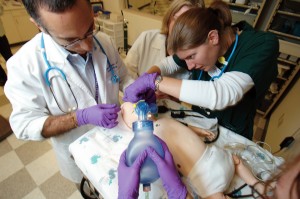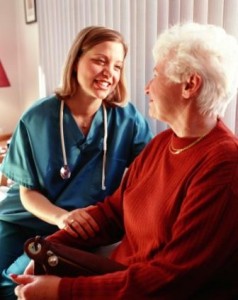A lot of us still don’t know the difference between an RN and a BSN. They just simply identify them as a nurse assisting doctors in the hospitals. But in reality, a nurse will never be just a plain nurse. There are a lot of types of nurses such as, a licensed practical nurse, a nurse practitioner, a licensed registered nurse. All of them are called nurses, but they have specific roles and functions. What is the difference between a registered nurse and a bachelor of science in nursing degree holder?
 Registered nurse is a job title; they have certifications and license to prove that they undergo several intense medical training. A BSN is just a degree. It is what you get when you finish your nursing education program. But before you can achieve the title of a registered nurse, you have to take the licensure exam called NCLEX, and you need a BSN degree before taking it. You should finish the 4-year nursing program to finish the degree. When it comes to working, registered nurses performs their typical duties, such as recording patient diagnosis, educate patients about their home treatment, assist surgical procedures and the most important duty of a nurse is to promote life.
Registered nurse is a job title; they have certifications and license to prove that they undergo several intense medical training. A BSN is just a degree. It is what you get when you finish your nursing education program. But before you can achieve the title of a registered nurse, you have to take the licensure exam called NCLEX, and you need a BSN degree before taking it. You should finish the 4-year nursing program to finish the degree. When it comes to working, registered nurses performs their typical duties, such as recording patient diagnosis, educate patients about their home treatment, assist surgical procedures and the most important duty of a nurse is to promote life.
BSN degree holders can also work too with great but limited opportunities. They may want to work as a public health nurse in the community or a nurse educator who teaches about promoting health. In terms of salary, Registered nurses receive a higher salary compared to BSN degree holders since they do intense and critical work. They deserve it because it’s not easy dealing with terminally ill patients, staying with them 24/7. There is a big difference when it comes to their roles and salary. Completing the BSN program is just the key for you to become a registered nurse. Always remember, hospitals hire more competent RNs.
 If you are a nurse with a Bachelor’s degree in Nursing, then you can pursue a diverse allied health career, you are more secure in your career growth and have good paying job opportunities. As compared to short term nursing courses, BSN graduates are more exposed to clinical settings and the training in communication, nursing techniques and methods are more advanced. Leadership is planned and taught during the course to prepare nurses for specialized positions in research, consultation or healthcare management.
If you are a nurse with a Bachelor’s degree in Nursing, then you can pursue a diverse allied health career, you are more secure in your career growth and have good paying job opportunities. As compared to short term nursing courses, BSN graduates are more exposed to clinical settings and the training in communication, nursing techniques and methods are more advanced. Leadership is planned and taught during the course to prepare nurses for specialized positions in research, consultation or healthcare management.






